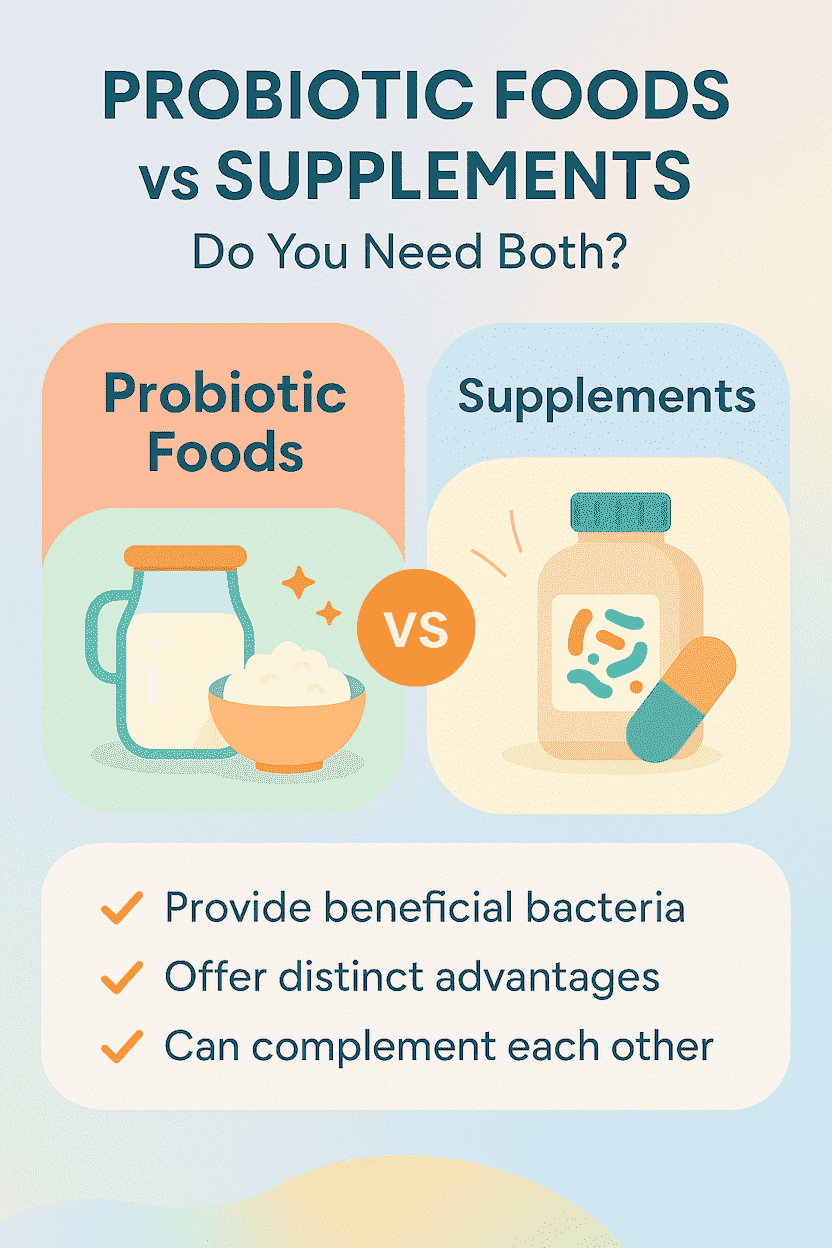Last update: November 6, 2025
6 minute read
Probiotic Foods vs Supplements: Do You Need Both?
From yogurt to capsules, here’s what science says about the best way to nourish your gut.

By Derick Rodriguez, Associate Editor
Edited by Dr. Dimitar Marinov, MD, RDN, PhD

With "live cultures" in yogurt, kombucha, and probiotic supplements, the question is: are daily supplements necessary, or can a fiber-rich diet and fermented foods suffice?
Gut health is central to digestion, immunity, and even mood regulation. Yet with so much conflicting advice, knowing whether to lean on foods, supplements, or both can feel overwhelming.
This article breaks down the science, cultural roots, and practical considerations so you can make informed, confident choices about your microbiome.
Key takeaways
- Probiotics are live microorganisms that can support gut and immune health, but strain and dose matter
- Fermented foods (yogurt, kefir, sauerkraut, kimchi) offer probiotics, nutrients, and fiber, but not all contain live cultures
- Supplements allow for precision (strain, CFU dose, allergen-free formulations) but vary widely in quality and evidence
What are probiotics?
The World Health Organization defines probiotics as “live microorganisms that, when administered in adequate amounts, confer a health benefit on the host.” These include familiar strains like Lactobacillus, Bifidobacterium, and certain yeasts.
Everyone’s microbiome is unique, shaped by diet, lifestyle, environment, and genetics. While scientists know that microbial diversity is linked with health, there isn’t a single “perfect” gut profile. Instead, probiotics may help nudge your microbiome toward balance, especially when it’s disrupted.

Beyond probiotics: Prebiotics, synbiotics & postbiotics
- Prebiotics are nondigestible fibers (found in onions, bananas, leeks, chicory root, whole grains) that feed beneficial bacteria.
- Synbiotics combine probiotics with prebiotics in supplements, designed to give microbes a head start.
- Postbiotics are the by-products of microbial fermentation, including short-chain fatty acids that nourish the gut lining and support immune health. They also include non-viable microbes or their components
While these terms are hot in marketing, high-quality clinical evidence is limited, especially for synbiotic and postbiotic supplements. Still, prebiotics from whole foods remain a safe, proven way to strengthen gut health.
Food sources of probiotics
Fermented foods
Classic sources include:
- Yogurt (with “live and active cultures”)
- Kefir
- Kimchi & sauerkraut
- Tempeh, miso, natto
- Kombucha
These foods not only deliver probiotics but also micronutrients and antioxidants that supplements lack. Fermented plant foods also contain fiber.
But not all fermented foods count
- Pasteurization (common in commercial products) kills beneficial microbes.
- Sourdough bread and vinegar-based pickles may be fermented, but don’t retain live probiotic cultures.
- Look for labels that explicitly state “contains live cultures”.
Processed foods & probiotic marketing
Probiotics now appear in chocolates, cookies, and sodas. While trendy, these don’t transform ultra-processed foods into healthy foods. In fact, “prebiotic sodas” may contain inulin fiber, but often add unnecessary sugars. Stability and dose in chocolates, cookies, sodas is often unreliable as well.
If you’re using them, think of them as a step-down from traditional sodas, not a gut health solution.
— Dr. Dimitar Marinov, MD, RDN, PhDFermented foods like yogurt, kefir, sauerkraut, and kimchi provide not only live microbes but also valuable nutrients and fibers that nourish the microbiome in a natural way. Supplements, on the other hand, allow for precision—specific strains and doses that have been studied for targeted effects, such as reducing antibiotic-associated diarrhea or easing some digestive symptoms.
Probiotic supplements
The appeal
Supplements offer:
- Targeted support (strain-specific, e.g., Lactobacillus rhamnosus GG for antibiotic-related diarrhea).
- Diversity (multi-strain blends can broaden microbial exposure).
- Accessibility (allergen-free, sugar-free alternatives to dairy or soy-based foods).
The challenges
- Quality control varies: Some products contain fewer live microbes than listed, or even different strains altogether.
- Evidence gaps: Studies show benefits for conditions like antibiotic-associated diarrhea, infectious diarrhea in children, and IBS—but results are inconsistent and often industry-funded.
- Buyer beware: Without regulation, marketing claims often outpace science.
A 2020 American Gastroenterological Association guideline found only limited support for probiotic supplements in certain digestive disorders, emphasizing the importance of strain, dose, and duration.
Science-backed benefits
Health Area | Foods | Supplements | Notes |
|---|---|---|---|
Antibiotic-associated diarrhea | Some protective effects (e.g., yogurt/kefir). | Stronger evidence for certain strains like LGG. | Supplements may be preferred here. |
IBS & digestive comfort | Anecdotal benefits from kimchi, yogurt, miso. | Mixed RCT evidence; strain/dose critical. | Try cautiously, track response. |
Immune health | Fermented foods are linked to immune support. | Some trials suggest small reduction in colds with supplements. | Still early evidence. |
Metabolic & mental health | Mostly observational links. | Emerging supplement trials, but not conclusive. | More research is needed. |

Get your personalized vitamin recommendations in less than 3 minutes.
Get your personalized vitamin recommendations in less than 3 minutes.

Best practices for usage
Food first
- Build a diet rich in fiber and variety; this fuels your microbiome long-term.
- Add a rotation of probiotic foods (dairy, vegetable, soy-based ferments).
- Look for “live culture” labeling and minimal processing.
When supplements help
- After antibiotics or GI disruptions.
- If you rarely eat fermented foods (due to allergies, preferences, or convenience).
- When addressing a specific condition (ideally under professional guidance).
Lifestyle matters
Ask yourself:
- Do I already eat a range of probiotic foods daily?
- Am I seeking general gut support or a specific outcome?
- Do allergies, intolerances, or convenience push me toward supplements?
Often, the answer is not either/or, but both.
Safety & side effects
- For most healthy people, probiotics are safe, with mild, temporary effects (gas, bloating).
- At-risk groups (immunocompromised, critically ill, premature infants) should avoid them unless medically supervised.
- Quality matters: seek third-party-tested brands, check CFU counts at end of shelf life, and confirm strain identity.
Frequently asked questions (FAQ)
Here are some of the most frequently asked questions about probiotic foods and supplements.
Final thoughts
Probiotic foods and supplements each have strengths. Foods deliver a holistic package, nutrients, fiber, and microbes, while supplements offer precision and accessibility. For most, starting with food and layering in supplements when needed is the safest and most effective approach.
Ultimately, nurturing your gut is about diversity, both in diet and microbial exposure. Pay attention to how your body responds, choose high-quality products, and remember that no capsule replaces the foundation of a whole-food, fiber-rich diet.
Curious about what your body needs most right now? Take our free health quiz to explore personalized supplement options and start building a gut health plan that works for you.
Sources and references
Editor

Derick Rodriguez
Derick Rodriguez focuses on editing health and wellness-related content. With over half a decade of experience in the digital realm, Derick has developed a unique skill set that bridges the gap between complex health concepts and accessible, user-friendly communication. His approach is deeply rooted in leveraging personal experiences and insights to illuminate the nuances of health and wellness topics, making them more approachable and empowering readers with knowledge and confidence.
Fact checker

Dr. Dimitar Marinov
Dr. Marinov has years of experience in scientific research and preventive and clinical medicine. His publications in peer-reviewed journals are on nutritional status, physical activity, and musculoskeletal disorders among adolescents.
At VitaRx, we're not just passionate about our work — we take immense pride in it. Our dedicated team of writers diligently follows strict editorial standards, ensuring that every piece of content we publish is accurate, current, and highly valuable. We don't just strive for quality; we aim for excellence.
Related posts
While you're at it, here are some other relevant articles you might be interested in.

Get your personalized vitamin recommendations in less than
5 minutes.
Get your personalized vitamin recommendations in less than
5 minutes.






